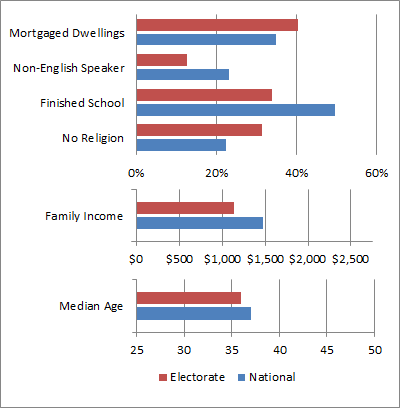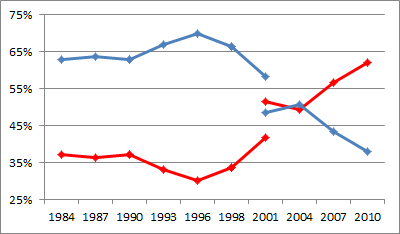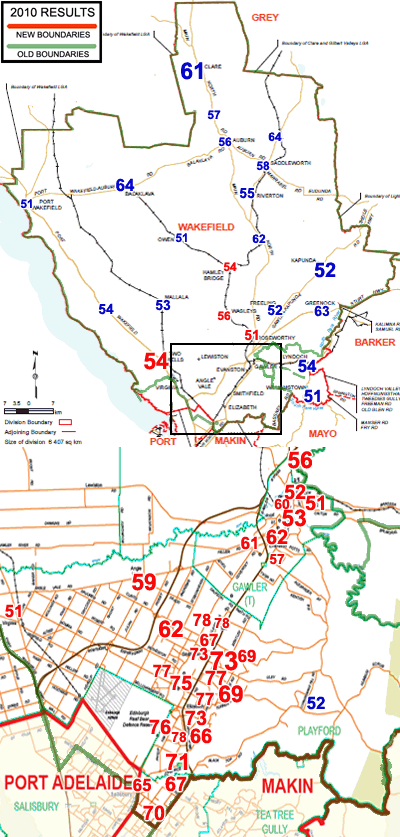UPDATE: Essential Research has the Coalition lead up from 55-45 to 56-44, from primary votes of 48% for the Coalition (steady), 33% for Labor (down one) and 9% for the Greens (steady). There are also numerous questions on national debt, led off by the finding that 48% are aware that Australia’s is relatively low compared to other countries against 25% who believe otherwise. However, 46% believe the main reason for Australia’s debt is that the “government are poor economic managers”, against 26% for the world economy and 17% for the high dollar. Same-sex marriage has been gauged for the second time in a fortnight, showing 58% support (up four on last time) and 32% opposition (down one).
Extending from outer northern Adelaide into rural territory beyond, Wakefield has existed in name since South Australia was first divided into electorates in 1903, but its complexion changed dramatically when its southern neighbour Bonython was abolished when the state’s representation was cut from 12 seats to 11 at the 2004 election. Previously a conservative rural and urban fringe seat encompassing the Murray Valley and Yorke Peninsula, it came to absorb the heavily Labor-voting industrial centre of Elizabeth in the outer north of Adelaide while retaining the satellite town of Gawler, the Clare Valley wine-growing district, and the Gulf St Vincent coast from Two Wells north to Port Wakefield. Labor’s overwhelming strength in Elizabeth is balanced by strong support for the Liberals in Clare and the rural areas, along moderate support in Gawler.
The redistribution to take effect at the coming election has cut Labor’s margin from 12.0% to 10.3% by making two changes at the electorate’s southern end. The boundary with Port Adelaide has been redrawn, removing 8000 voters in the strongly Labor area around Salisbury North while adding around 700 west of Princes Highway. Immediately east of Gawler the boundaries have been made to conform with those of Barossa Valley District Council, adding 2600 voters around Lyndoch from Barker and 2100 around Williamstown from Mayo.
Prior to 2004, Wakefield was won by the prevailing major conservative party of the day at every election except 1938 and 1943, the only two occasions when it was won by Labor, and 1928, when it was by the Country Party. The seat was held for the Liberals from 1983 to 2004 by Neil Andrew, who served as Speaker from 1998 onwards. When the 2004 redistribution turned Wakefield’s 14.7% margin into a notional Labor margin of 1.5%, Andrew at first considered challenging Patrick Secker for preselection in Barker, but instead opted to retire. Wakefield was nonetheless retained for the Liberals at the ensuing election by David Fawcett, who picked up a 2.2% swing off a subdued Labor vote around Elizabeth to unseat Martyn Evans, who had held Bonython for Labor since 1994. Fawcett’s slender margin was demolished by a 7.3% swing in 2007, but he would return to parliament as a Senator after the 2010 election. As was the case with Labor’s other two South Australia gains at that election, Wakefield swung strongly to Labor in 2010, boosting the margin from 6.6% to 12.0%.
Labor’s member over the past two terms has been Nick Champion, a former state party president, Shop Distributive and Allied Employees Association official and staffer for state Industrial Relations Minister Michael Wright. The SDA link identifies him with the potentate of the South Australian Right, Senator Don Farrell. Champion came out in support of Kevin Rudd in the days before his unsuccessful February 2012 leadership challenge, resigning as caucus secretary to do so. Champion’s Liberal opponent will be Tom Zorich, a local sports store retailer, former Gawler councillor and one-time player and club president of the Central Districts Football Club. Despite the size of the margin he faces, the Liberals are reportedly buoyed by weak polling for Labor in South Australia generally, and by Holden’s announcement in April that 400 jobs would be cut at its Elizabeth plant.










Crikey is committed to hosting lively discussions. Help us keep the conversation useful, interesting and welcoming. We aim to publish comments quickly in the interest of promoting robust conversation, but we’re a small team and we deploy filters to protect against legal risk. Occasionally your comment may be held up while we review, but we’re working as fast as we can to keep the conversation rolling.
The Crikey comment section is members-only content. Please subscribe to leave a comment.
The Crikey comment section is members-only content. Please login to leave a comment.